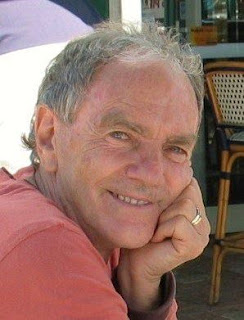A treatise on shelling beans.
I have just finished "Traktat o łuskaniu fasoli" (A treatise on shelling beans) by Polish author - Wiesław Myśliwski. This book was highly recommended (in fact, a gift) from my sister and brother-in-law. Though I am not a literary critic, I would like to share a few thoughts in as much as the book seems to be relevant to the subjects of this blog.
First of all, it reads well. I normally prefer non-fiction, but this book seems to have a natural flow and kept me wanting to get to know what would happen next. It is written in a fashion of monologue of the main character, unnamed (to give him a more universal appeal?), a person of simple origins, but a very inquisitive mind. The monologue (at times inferred dialogue with the author of the book) is colorful - it reminds me a bit of the flavor and richness of Bohumil Hrabal's prose. It seems to be based on a real life story, which Myśliwski heard about or perhaps, I speculate, even recorded.
The main character appears to have lost all his family during the war, lived alone as a child in a potatoes dugout, was rescued by the partisans, sent to school for orphans after the war, and eventually progressed to become electrician. His life received another dimension when he started playing saxophone. This skill allowed him to survive in the West, where he stays after one of the contract jobs. He eventually returns to his village to become a guardian of a small cottage community. This is more or less the plot of the book.
What appears interesting for me in this book, is the main character's wonder of what really constitutes his real self. This is being narrated in a number of passages in the book. The main character seems to have difficulty discerning if he is more true in his real life or in his dreams, where he starts and where he ends in a fog, etc. This kind of problems with boundaries are not unusual for people who suffered from trauma. He also wonders about the role of memory in deciding who he is, implying that it is probably better for him not to remember many things.
These reflections on the nature of the self, bring to my mind associations with the philosophy of Nisargadatta. One of the tenets of his philosophy is that we are not ... our bodies. Our true nature is awareness, through which we are connected with "everything that is." I am not implying that Myśliwski was inspired by Nisargadatta, but Nisagadatta's philosophy could explain some of the most dramatic twists of the book.
In one of the scenes, our main character is greeted in the street, somewhere in the West, by another person who thinks he knows him. The magnetic pull is so strong between them that they decide to go for a coffee to find out where they know each other from. During this conversation it becomes apparent that they could have never met. However, the greeter appears to be a son of the man, whose unit (by implication Wermacht or SS) murdered our main character's family. If not completely fictitious, a situation like this could be explained only if there was some deeper connection, on the level of awareness not yet comprehended, between these two characters.
Another interesting reflection of Myśliwski is on the relation between incident and destiny. The main character meets a woman, first on a train, then in the park of the sanatorium they both attend, and finally in a coffee shop. She sits at his table as ... there are no other spots available! They start to talk and eventually become lovers. What appears to pull them toward each other is that both suffered from trauma (she being a survivor of a concentration camp). It is this trauma that both attracts them to each other and prevents them from forming a working relationship. It is as if they were MEANT to meet each other in order to heal on some level.
Yet another interesting notion in the book is that of nostalgia. We all miss something, wait for something or someone, Myśliwski seems to suggest, often not realizing we are doing it. I have the feeling that this has always applied to me.
Finally, there is a motif of aging. The main character realizes at some point that, because of rheumatism, he won't be able to play saxophone any more, which was what kept him going through his life. In spite of this loss, he finds some reasons to continue. He lives a life of solitude, with only two dogs being his companions, guarding cottages and renewing wooden grave inscriptions on the local cemetery. He finds pleasure in simple things, such as shelling beans, while having plenty of time to reflect on his life. It is this healing force of awareness, it appears, that allows him to integrate everything.
Witek, Magda - than you for recommending this book to me.
(PR)
First of all, it reads well. I normally prefer non-fiction, but this book seems to have a natural flow and kept me wanting to get to know what would happen next. It is written in a fashion of monologue of the main character, unnamed (to give him a more universal appeal?), a person of simple origins, but a very inquisitive mind. The monologue (at times inferred dialogue with the author of the book) is colorful - it reminds me a bit of the flavor and richness of Bohumil Hrabal's prose. It seems to be based on a real life story, which Myśliwski heard about or perhaps, I speculate, even recorded.
The main character appears to have lost all his family during the war, lived alone as a child in a potatoes dugout, was rescued by the partisans, sent to school for orphans after the war, and eventually progressed to become electrician. His life received another dimension when he started playing saxophone. This skill allowed him to survive in the West, where he stays after one of the contract jobs. He eventually returns to his village to become a guardian of a small cottage community. This is more or less the plot of the book.
What appears interesting for me in this book, is the main character's wonder of what really constitutes his real self. This is being narrated in a number of passages in the book. The main character seems to have difficulty discerning if he is more true in his real life or in his dreams, where he starts and where he ends in a fog, etc. This kind of problems with boundaries are not unusual for people who suffered from trauma. He also wonders about the role of memory in deciding who he is, implying that it is probably better for him not to remember many things.
These reflections on the nature of the self, bring to my mind associations with the philosophy of Nisargadatta. One of the tenets of his philosophy is that we are not ... our bodies. Our true nature is awareness, through which we are connected with "everything that is." I am not implying that Myśliwski was inspired by Nisargadatta, but Nisagadatta's philosophy could explain some of the most dramatic twists of the book.
In one of the scenes, our main character is greeted in the street, somewhere in the West, by another person who thinks he knows him. The magnetic pull is so strong between them that they decide to go for a coffee to find out where they know each other from. During this conversation it becomes apparent that they could have never met. However, the greeter appears to be a son of the man, whose unit (by implication Wermacht or SS) murdered our main character's family. If not completely fictitious, a situation like this could be explained only if there was some deeper connection, on the level of awareness not yet comprehended, between these two characters.
Another interesting reflection of Myśliwski is on the relation between incident and destiny. The main character meets a woman, first on a train, then in the park of the sanatorium they both attend, and finally in a coffee shop. She sits at his table as ... there are no other spots available! They start to talk and eventually become lovers. What appears to pull them toward each other is that both suffered from trauma (she being a survivor of a concentration camp). It is this trauma that both attracts them to each other and prevents them from forming a working relationship. It is as if they were MEANT to meet each other in order to heal on some level.
Yet another interesting notion in the book is that of nostalgia. We all miss something, wait for something or someone, Myśliwski seems to suggest, often not realizing we are doing it. I have the feeling that this has always applied to me.
Finally, there is a motif of aging. The main character realizes at some point that, because of rheumatism, he won't be able to play saxophone any more, which was what kept him going through his life. In spite of this loss, he finds some reasons to continue. He lives a life of solitude, with only two dogs being his companions, guarding cottages and renewing wooden grave inscriptions on the local cemetery. He finds pleasure in simple things, such as shelling beans, while having plenty of time to reflect on his life. It is this healing force of awareness, it appears, that allows him to integrate everything.
Witek, Magda - than you for recommending this book to me.
(PR)



Comments
Post a Comment